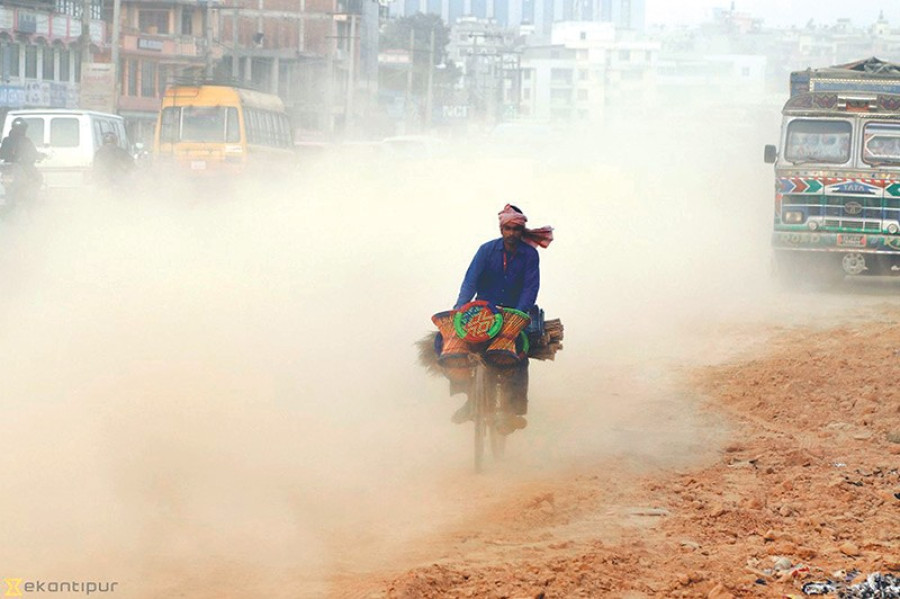National
Pollution more than pulmonary: look after your eyes too
Itchy or dry eyes and allergies might seem harmless, but leaving them alone or taking unprescribed drugs can have detrimental and lasting effects.
Thomas Heaton
Itchy or dry eyes and allergies might seem harmless, but leaving them alone or taking unprescribed drugs can have detrimental and lasting effects.
Eye specialists in Kathmandu are seeing an increase in the number of patients with pollution-related problems, but say they can be dealt with easily before they become too grave.
Pulmonary and cardiac diseases are closely associated with Kathmandu’s pollution problem and have been predicted to shorten Kathmandu residents’ lifespans by 30 months. However, eye problems too are becoming increasingly common and treatment is often overzealous or unsuitable.
Tilganga Institute of Ophthalmology’s Dr Purnima Rajkarnikar Sthapit says, in any given ophthalmology clinic, more than 50 percent of patients carry symptoms of pollution-related irritation. The smoke, the dust, and the resulting added heat, irritate eyes.
“Nowadays, particularly within the last two or three years, we are getting more and more patients with itchiness of the eyes and discharge,” says the ocular oncologist and oculoplastic surgeon.
Even when inside, given the high levels of pollution, fans and air-conditioning units can cause further problems. The airflow, combined with the dust-levels, dry out eyes further, she says.
“The dust particles and the pollution increases the heat of the air. Smoke can too.”
Some patients who have moved from outside the city present problems they never had before in their hometowns.
Nepalese Association of Optometrists President Niraj Dev Joshi says the long-term implications of pollution-related eye problems can be serious.
If eyes are dry and go untreated, the long-term effects on tear production mean the cornea is repeatedly scratched while blinking. Eventually the cornea will scar and this could lead to blindness, although it is uncommon, he says.
“Once your eye gets dry you get symptoms such as dry and itchy eyes. This can have long-term effects,” says Joshi. “Dry eyes and pollution can lead to permanent damage because tear-producing cells will be reduced.”
Tissue growth in the corner of the eye, near the nose, can also occur when exposed to excess dust and sun. It tends to happen following excess aggravation, but can be avoided by using sunglasses.
Sthapit says the pollution problem is unavoidable, especially when riding a two-wheeler in Kathmandu.
“You should be wearing a full-face helmet,” she says. If walking around town, dark glasses should help the problem too, while staying out of the way of air-conditioning and fans is important.
Then, when eyes are itchy, one must resist the urge to scratch because the dust in one's eyes can aggravate eye problems too. Over-the-counter lubricating eye drops are a good antidote, says Joshi.
“The people living in Kathmandu are exposed to pollutants every day—it will effect these people in the long run.”
When it comes to looking after your eyes, however, if the problem is bad it is important to use the right methods—that means seeing a specialist.
“At a pharmacy or shop they might give you some strong medicines or stuff that is not needed,” Sthapit says.
Antibiotics and steroids are dispensed haphazardly, which can lead to problems later on, while flushing eyes with water is a risky business. Using unneeded steroids can lead to glaucoma or cataracts, while antibiotics can lead to increased bacterial resistance.
“People also have this habit of splashing water directly into their eyes in the morning. But dirty water can cause problems,” she says.
The quality of water being used to flush eyes means problems could be aggravated. Recent tests on several drinking water sources in Kathmandu have found the presence of E coli and coliform, due to pig and duck farming near water sources.




 9.7°C Kathmandu
9.7°C Kathmandu














